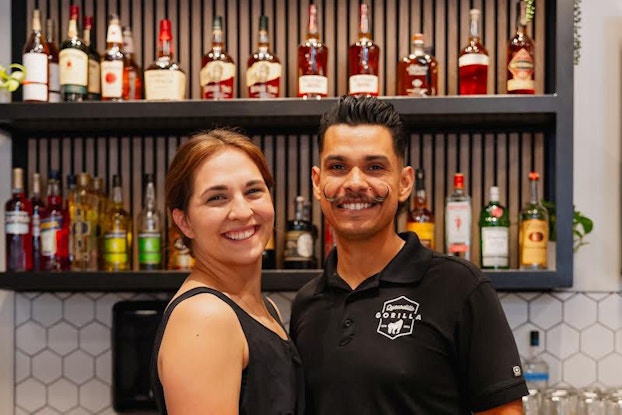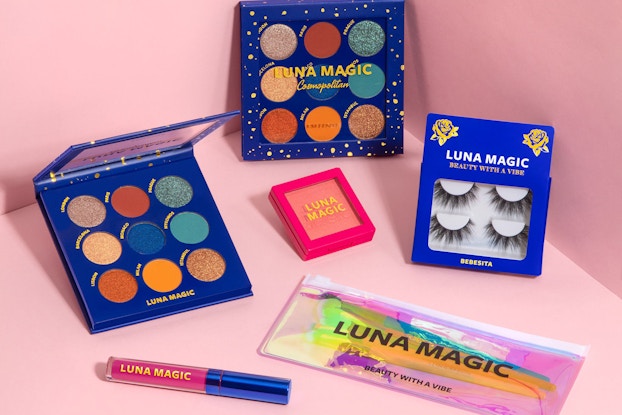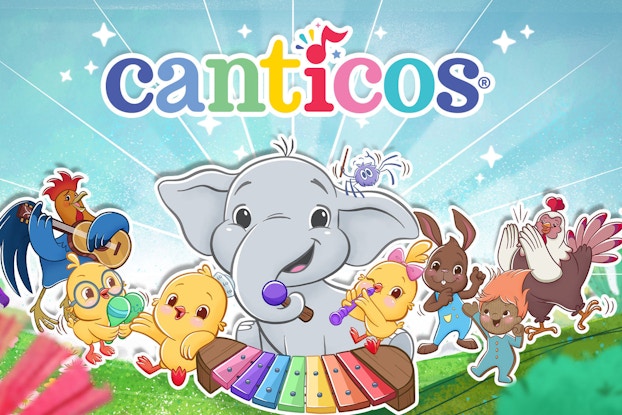
Why it matters:
- Latinos make up the fastest-growing segment of entrepreneurs, creating new businesses at multiples the rate of other groups.
- But of the 4.65 million Latino-owned businesses in the United States, only 3% have hit $1 million or more in revenue. A major barrier is the lack of access to the capital they need to scale up.
- Businesses that have beat the odds have leaned into franchising, leveraged personal connections, and zeroed in on creating a multimedia brand.
Miguel Reyes and Mikayla Sarr had just started dating when Reyes borrowed Sarr's savings to take over a 400-square-foot pizza-by-the-slice shop in Visalia, California. After shutting down the store before reopening, the couple had an epiphany: Instead of pizza, they'd sell quesadillas, but with a similar approach. They'd give build-your-own options with different sauces and cheeses and incorporate family recipes into the mix.
Miguel's gamble paid off. Now, 11 years later, the married couple's Quesadilla Gorilla has five locations across California, Texas, and Nevada, with each pulling in around $750 to $1.2 million in revenue a year, making it the fastest-growing quesadilla company in the country. In 2019, Fortune Magazine recognized Quesadilla Gorilla for becoming the third-fastest-growing inner-city business in America. Reyes anticipates the business will grow between 50 and 100 restaurants over the next five to seven years. As a Hispanic-owned company that has reached, and exceeded, $1 million or more in revenue annually, the company is somewhat of an anomaly.

Interested in a small business membership?
Find out how the U.S. Chamber of Commerce can help your company grow and thrive in today's rapidly-evolving business environment. Connect with our team to learn how a small business membership can benefit your bottom line and help you achieve your goals.
Of the 4.65 million Latino-owned businesses in the United States, only 3% have hit that milestone, even as Latinos make up the fastest-growing segment of entrepreneurs, creating new businesses at multiples the rate of other groups and contributing over $700 billion in sales to the economy each year, according to the Aspen Institute. A major barrier is that many Hispanic-owned businesses face issues accessing traditional funding sources like bank business loans, venture capital, or angel investments. Without capital, scaling up can be a big challenge.
Quesadilla Gorilla leaned into partnerships to grow, while other businesses surpassing the $1 million mark have succeeded by honing brand development, mining personal connections, and filling a niche in the market. CO— talked to three Hispanic-owned business owners who have beat the odds to hear how they started their endeavors and how they successfully scaled.
With franchising, Quesadilla Gorilla owners take a step back to move forward
After opening their first location, the Reyes began catering events and built a food truck for that purpose. But the truck was also essential for testing out different markets as they decided where to open subsequent restaurants.
Four years after their first location, they opened two more in Fresno. One wasn't successful, and they ended up shutting it down. Then during the height of the pandemic, a property owner in Three Rivers, California, a village in the Sierra Nevada foothills at the entrance to Sequoia National Park, reached out to the couple.
The property owner had a piece of land where he wanted a food truck. The engine on the Reyes' truck blew out, but they towed it to Three Rivers and opened at a time when few people were dining indoors. "Business was great," Miguel said. "We were super busy."
In the last two years, the Reyes have pivoted, turning to the franchise model as a way to quickly and efficiently scale up. They still own two restaurants, while franchisees own the other three.
"We can only grow so much with our own capital," Miguel said. At the same time, especially in the food industry, it's hard to attract investors without massive returns, he adds. "Our thinking was, let’s bring on other people to help grow the brand, utilizing what they've saved up … [to invest in our brand]."
For the Reyeses, taking a step back has helped them to move forward. "I can't be the most important person in my company," Miguel said. "The business needs to grow without me. It's about, how do I train my team, cast vision on them, and point them where they're going."

Personal connections and a 'Shark Tank' appearance helped Luna Magic break into big retail
The daughter of emigrants from the Dominican Republic, Shaira Frias graduated with a degree in journalism but was more interested in makeup.
She went to makeup school in New York, then attended Cosmoprof Worldwide Bologna, Italy's annual beauty exposition. She noticed that many makeup brand owners were men. Back home, she developed an eyeshadow palette, two lip products, and two eyelash styles. Her goal was to make high-quality products at prices accessible to anyone.
Frias created a website for her Luna Magic business and started selling direct to consumers. "I was naive in thinking that, once you build a website and it goes live, people are automatically going to find you, and obviously, that's not the case," Frias said.
That same year in 2019, a friend knew a buyer at Walmart and made a connection. Frias got an interview, and Walmart agreed to carry her products on Walmart.com as part of the Walmart Beauty Box of curated beauty products.
'With the "Shark Tank" help, we were able to execute the Walmart program. It sold out, and the buyer was more confident bringing us into stores." Within a year, Frias had made over $1 million. From there, she participated in Target's Accelerator Program.Shaira Frias, Owner and CEO of Luna Magic
Selling her products that way meant smaller profits. The whole box retailed for $5 at the time, while Frias was charging $26 for her eyeshadow palette. But she figured she had nothing to lose — the alternative was her products sitting unused in her garage. So she sold them 15,000 palettes. "I wanted awareness and marketing," she said.
"It was a great move because customers ended up leaving good reviews, and the Walmart buyer became more aware of us." From there, Walmart displayed her products on endcaps for six weeks at stores across the country.

Soon after, an appearance on "Shark Tank" gave her business another boost. Frias got an offer from Barbara Corcoran for a $250,000 line of credit for 30% of the company. Frias moved products to a warehouse and hired her first employee, a warehouse manager.
"With the 'Shark Tank' help, we were able to execute the Walmart program. It sold out, and the buyer was more confident bringing us into stores." Within a year, Frias had made over $1 million. From there, she participated in Target's Accelerator Program.
Now, her products are on Target and CVS shelves too. Frias expects to hit well over seven figures in revenue this year. More big plans are in the works for late 2025, including moving Luna Magic toward being more of a lifestyle brand.
Along the way, Frias leaned on financial help from a family member who's also been a mentor. "I would tell other business owners to rely on the resources they already have," she said. "You'd be surprised how many people in your circle can actually help you."
[Read more: How 4 Buzzy Minority-Owned Startups Scored Funding Windfalls]

Encantos CEO: Creating a multimedia brand that brings stories to life for Latino children via outlets from Nickelodeon to MacMillan
For former ad executive Susie Jaramillo, now Co-Founder and CEO of award-winning children's entertainment company Encantos, success has come from diligently building a multimedia brand around storytelling and Latino culture. The company has been named by Fast Company as one of the world's most innovative companies and is positioning itself as the next big preschool brand.
The Venezuelan-American Jaramillo got her start after she left the ad world to get back to her art school and storytelling roots. As an executive helping companies sell products, she learned about the significant opportunity around selling products and services to Latino consumers. Their purchasing power in the U.S. is poised to surge to $2.6 trillion by 2025, up an estimated 150% in the last decade. Meanwhile, almost 30% of U.S. kids are Latino. She wanted to fill the gap in books and stories representing Latino children.
Jaramillo wrote and hand-painted the pictures for a series of board books based on Latino nursery rhymes and created a complementary subscription app too.
"From the beginning, we wanted to use tech for scale and to reach everyone in a more interactive way," Jaramillo said.

A sing-a-long video she created and posted on YouTube around her Canticos books, which features baby chicks, drew 23 million views in one year. That attracted the attention of Nickelodeon. Two years after Jaramillo started Encantos, the TV channel turned Canticos into an animated series.
From there, Jaramillo and her co-founder expanded the brand, fine-tuning a bilingual learning app that's available on the Apple Store and creating merchandise like puzzles. It's now a multifaceted brand with multiple revenue streams and other storylines and characters, including Skeletina, a fearless girl living in the "in-between world."
Jaramillo joined forces with Macmillan on Skeletina. The publishing company is the global distributor of her books, and she co-publishes with them. Currently, a Skeletina animated series is in the works, and there's an interactive web component where kids can share a bad dream online and a dream machine spits out a happier one.
At the same time, Jaramillo prioritizes in-person events for customers who've become dedicated fans and brand ambassadors. Parents host elaborate Canticos parties chock full of homemade decorations. They post pictures on social media. At events, Jaramillo reads to the audience while her 13-year-old daughter, Mila, operates a chick puppet.
Surveying Canticos products sold on Etsy that families buy for their events gives Jaramillo ideas for additional products she could potentially develop and sell on her own website. "I use it as an incubation for learning," she said.
In raising money with impact investors, Jaramillo emphasized her app and how she uses tech to build deeper engagement with core customers. "We showed how we were building an incredibly scalable business that’s lightweight and nimble and targets an incredibly lucrative market," she said.
Most recently, she developed a pilot for a new climate-focused series called "This is Cooler" with the Aspen Institute. Gloria Estefan starred in it. The video drew 5.2 million views on YouTube in a week. Jaramillo is looking for a partner to develop the full series.
"It's all about finding creative ways of building up our IP [intellectual property] and of using tech and partnerships," she said. To other business owners, she advises, "focus on your customer and your audience and the problem you're solving for them. It's that simple."
CO— aims to bring you inspiration from leading respected experts. However, before making any business decision, you should consult a professional who can advise you based on your individual situation.
CO—is committed to helping you start, run and grow your small business. Learn more about the benefits of small business membership in the U.S. Chamber of Commerce, here.







